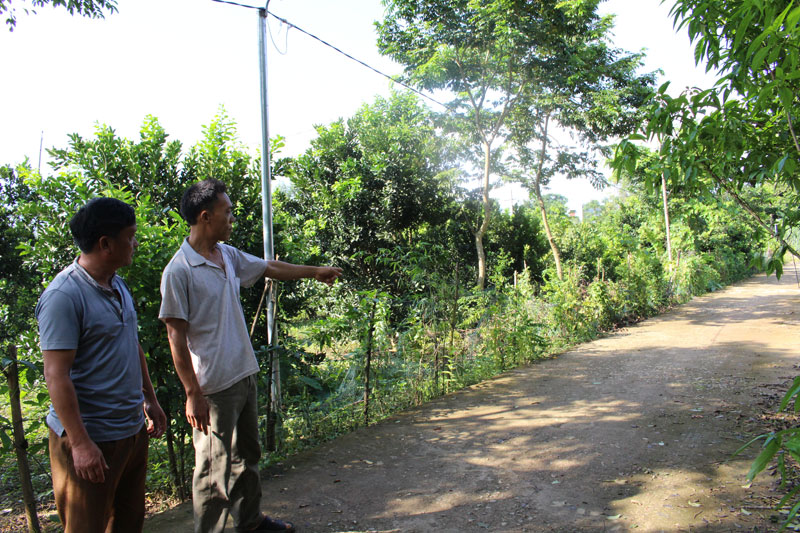
(HBO) - In Tu Ly commune, Dao ethnic people account for more than 20% of the population. Dao ethnic live mainly in Ma hamlet, Tay Mang, Huong Ly and Mit hamlet. Recently, with the timely attention from the Party Committee and the local authorities in the socio-economic development, the life of Dao ethnic people in Tu Ly commune has changed. Every family has a TV, a refrigerator, a motorbike, etc. The hillsides have been cleared and greened by the gardens of corn and pomelos.
 Dao ethnic people in Tu Ly commune (Da Bac) have been
actively participating in the movement of donating land to build roads. The
photo has been taken at Ma hamlet, Tu Ly commune.
Dao ethnic people in Tu Ly commune (Da Bac) have been
actively participating in the movement of donating land to build roads. The
photo has been taken at Ma hamlet, Tu Ly commune.
Upholding the hard-working and industrious tradition, Dao
ethnic people in Tu Ly commune have always made great efforts in the economic
development. Dao ethnic people in the commune always go ahead in responding to
the undertakings and policies of the party committee and the local government on
restructuring plants and animals.
The active participation in the training
courses on technology transfer in crop and animal husbandry and the loan
support for economic development have contributed to raising incomes, reducing
hunger and poverty for Dao ethnic people in the area. The average income of Dao
ethnic is about 35 million VND a person every year. There are a lot of Dao
ethnic households doing good business such as Mr. Trieu Van Dong (Ma village),
Ly Van Xuan, Ly Manh Ha, Ly Van Hoi (Mit village) in the commune.
Mr. Trieu Phuc Chan (70 years old) in Ma village, a
reputable person, always wants Dao ethnic people in Tu Ly commune to preserve
the uniqueness in Dao culture for the younger generation. Therefore, he still
silently teaches the spoken language as well as the writing and the customs of
Dao ethnic people to the younger generation everyday. According to him, no
matter how life changes, in the life of the Dao people it cannot ignore Cap Sac
Ceremony for men (A ceremony to acknowledge the men’s maturity). When granted
an identity, the man is considered to be mature and has the right to
participate in the basic tasks of the hamlet.
In addition, Dao ethnic people
also pay great attention to the ancestor worship, in which Nhay New Year
Festival is a special ritual, and it is considered the most important festival
of Dao ethnic people. Nhay New Year Festival demonstrates the principle of
"drinking water, remembering the source”, revering the ancestors, connecting
the community to build a prosperous and happy village together. Additionally,
the traditional costumes such as clothing, dresses, brassieres, scarves and
hats are worn daily by Dao ethnic people. Dao ethnic people in Tu Ly also
consciously preserve their writing through the transmission of writing to the
younger generation. The local people often practice their traditional dance and
folk song to perform at important events of the commune and district.
More than just an information technology teacher, Bui Van Nien is an inspiring figure who has nurtured the scientific curiosity and creative spirit of students in Vietnam’s ethnic minority communities.
Da Bac is the most disadvantaged mountainous district in Hoa Binh province, with ethnic minorities accounting for about 90% of its population. Over the past years, the district has mobilised resources to implement ethnic policies to improve the quality of life of local people.
In recent years, Hoa Binh province has consistently prioritised the protection, care, and education of children, particularly those from ethnic minorities and disadvantaged backgrounds, by creating a safe, healthy, and nurturing environment for their all-round development.
The Steering Committee for Tobacco Harm Prevention and Control of Hoa Binh province, in coordination with the Tobacco Harm Prevention and Control Fund, held a ceremony on May 28 in response to the World No Tobacco Day (May 31) and the National No Tobacco Week (from May 25 to 31). The event was chaired by Nguyen Van Toan, Standing Vice Chairman of the provincial People’s Committee and head of the Steering Committee.
Since 2021, the Center for Industrial Promotion and Industrial Development Consulting (CIIDC) under the Department of Industry and Trade has been implementing a school lighting model as part of the plan for using energy efficiently and economically in Hoa Binh Province in the pẻiod of 2021 - 2025. This model not only aims to improve the learning conditions and enhance the education quality, but it also promotes the message of energy saving, energy security, environmental protection and contributes to the goals of socio-economic development.
In the 2024 - 2025 school year, the entire Hoa Binh provincial education sector includes 520 educational institutions and schools. Among them are 13 ethnic boarding schools with 153 classes and 4,487 students. Four of these schools have met national standards, reaching 30.7 percent.



 Dao ethnic people in Tu Ly commune (Da Bac) have been
actively participating in the movement of donating land to build roads. The
photo has been taken at Ma hamlet, Tu Ly commune.
Dao ethnic people in Tu Ly commune (Da Bac) have been
actively participating in the movement of donating land to build roads. The
photo has been taken at Ma hamlet, Tu Ly commune.